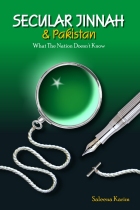|
|
|
Latest interview of Saleena Karim on SJ2, given to Talha Mujaddidi, 3 December 2010: http://pak1stanfirst.com/201012022943/think-tank/leaders/interview-of-saleena-karim.html or: http://www.pakistankakhudahafiz.com/2010/12/09/islam-is-about-life-jinnah/ Interview to Talha Mujaddidi at Pakistan Ka Khuda Hafiz, 18 September 2009: http://pakistankakhudahafiz.wordpress.com/2009/09/18/jinnah-secular-or-islamist/
LATEST INTERVIEW EXCERPTS: TM: What inspired you to write a book setting the record straight with respect to Justice Munir? SK: My original research began with an accidental discovery that a certain speech of Jinnah (the Munir quote) could not be traced to any of Mr. Jinnahs speeches but could only be found in Munirs From Jinnah to Zia (1979) or so I thought at the time. I had simply intended to write an article explaining the issue with the quote. In fact I almost didnt even write the article as I had not grasped the significance of what I had found. My research took me in unexpected directions and I began to see there was much more to the story of the quote than I had first realised, but I kept the book relatively short. Sometime after SJ1s (Secular Jinnah, 2005) release I discovered that the Munir quote actually had its origins in the Munir Report of 1954 i.e. same author, but different publication. Interestingly, the Munir quote was first used to deadly effect in the Pakistan Constituent Assembly debates of 1954, shortly before Ghulam Muhammad dissolved the Assembly. I have reviewed this in detail in SJ2, but otherwise my book is not centred on Justice Munirs quote. TM: Some people in the Pakistani media have said that Quaid-e-Azam was not a democrat but was a dictator. Was he a dictator or a democrat, or was he in favor of a Khilafat System? What did Quaid-e-Azam think of an Islamic system of governance? SK: The Quaid was a strong leader and he often
had to make tough decisions. But in no way was he a dictator. Throughout
his career he always respected and represented the interests of
his people, even when he did not personally agree with them. He
is one of the few true democrats of recent history. I have discussed
this at length in SJ2. TM: In SJ2, what do you mean when you say that Quaid-i-Azam is neither secularist nor religionist nor a product of synthesis (secular-Islam)? SK: Quaid-e-Azam seems to have been misunderstood
because many commentators, Muslims included, have not viewed Islam
as he did, and so they look at his personality and career through
their own prisms. His speeches and writings provide clear and definitive
evidence that he was neither a secularist in the technical sense
any more than he was a religionist in the technical sense. The same
is true for Iqbal, who is wrongly accused of being the leading light
in favour of what is sometimes called secular-Islam a supposed
mix of old religious concepts and present-day political theories.
Without getting too philosophical, Islam and secularism are based
on completely different views of the universe, which is why combining
them is absurd. Islam is neither a religion nor a polity but a code
of conduct that influences our every action. Jinnah said it best
when he said that Islam was about life. Both he and Iqbal understood
this, and I have provided ample proof from their own statements.
|
Secular Jinnah
& Pakistan:
What the Nation Doesn't Know
Publisher:
CheckPoint Press, Ireland
Paramount Books, Karachi
ISBN:
978-1-906628-22-2
Book Data:
Paperback
6.14 x 9.21 inches
xiv, 318 pages
Includes bibliography
and index
What is the Munir quote?
